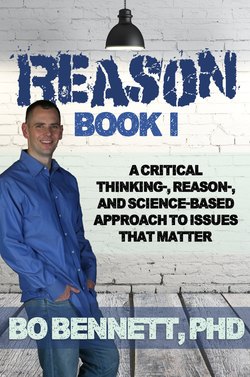Читать книгу Reason: Book I - Bo Bennett - Страница 20
На сайте Литреса книга снята с продажи.
Money and Science: Just How Skeptical Should One Be?
ОглавлениеAccording to a recent review published by Princeton, financial interest is a common reason for distrust in scientists4. Anecdotally, in my discussions with people about science, money seems to be the top reason for their distrust in science. But there is a line between healthy skepticism and irrational distrust when parties have financial interests in scientific outcomes. The question is, where do we draw that line? Every study or area of research must be looked at independently rather than globally trusting or distrusting scientists or even “science.” To have an informed opinion, we need to know enough details about the study or area of research as well as consider some fundamental points.
Fallacious Reasoning. This default position of distrust is based on the Ad Hominem (Circumstantial) fallacy, which is when one suggests that the person who is making the argument is biased or predisposed to take a particular stance, and therefore, the argument is necessarily invalid. More specifically, in this case, it is suggesting that research necessarily cannot be trusted because the scientist has an interest in the outcome. This is like rejecting your doctor’s advice because they are paid to take a personal interest in your health. Like your doctor’s interest in your health, the vast majority of professionals, scientists included, are interested in both their own well-being as well as the well-being of the people they serve. This doesn’t make them evil; it makes them human.
The Demonization of “Big” Industry. Growing up, we had an arcade-style pinball machine in our basement that I used to play all the time. The game allowed you to “nudge” the ball by modestly shaking the machine, but would trigger a loud buzz and result in the end of the play for that ball if the nudge was more of a tilt. In the field of science, especially where big industry is involved, ulterior motives can and do result in both nudges and tilts. The nudges might be seen in overreaching conclusions, loose interpretations, over-hyped press releases, and other means of salesmanship that deviate from the scientific method and manage to make it past the journal editors. The tilts are statistically rare and are found mostly in the falsification of data. The misinformation introduced by these tilts don’t go unnoticed thanks to the scientific method. Given that scientific truths are arrived at by the convergence of data (i.e., multiple studies that support a general conclusion), nudges have relatively little effect—especially if research on an issue is conducted equally by those with financial interests in opposite outcomes. Whether a billion dollars is spent on a coin flipping study, or a few thousand dollars, taking into consideration the nudges and the tilts, the results that heads comes up about 50% of the time will not change. Scientific facts cannot be purchased, nor can they be bribed to go away.
Money is Not the Greatest Motivator. There are far greater motivators than money including power, fame, prestige, meaning or purpose, being a hero by exposing perceived injustice, or believing that one is securing one’s place in Heaven by saving souls from an eternity of torture. If we are going to consider how money can influence science, we need to also consider the motivations of those who oppose science and scientific consensus. When this idea is critically evaluated, we find biases and personal interests everywhere. The difference is, the scientific method is the only method designed to deal with these biases, and it’s not bloggers, the media, political commentators, politicians, or religious leaders who deserve our trust to answer scientific questions; it’s scientists.
It is fallacious to assume dishonesty solely because of personal interest. It is fallacious to reason that industries with the most money determine scientific facts or that the “little guy” must have the scientific truth on his side because of big bad industry. It is lazy thinking to focus on how personal interest in the form of money might influence scientific findings without considering how money along with other forms of personal interest fuel the anti-science movement. Questioning the legitimacy of a study is an important part of the scientific process, just make sure you avoid the fallacies mentioned when forming your opinion.
1 Benson, H., Dusek, J. A., Sherwood, J. B., Lam, P., Bethea, C. F., Carpenter, W., … Hibberd, P. L. (2006). Study of the Therapeutic Effects of Intercessory Prayer (STEP) in cardiac bypass patients: A multicenter randomized trial of uncertainty and certainty of receiving intercessory prayer. American Heart Journal, 151(4), 934–942. doi:10.1016/j.ahj.2005.05.028
2 De Gloucester, P. C. (2013). Referees Often Miss Obvious Errors in Computer and Electronic Publications. Accountability in Research, 20(3), 143–166. doi:10.1080/08989621.2013.788379
3 Street, 1615 L., NW, Washington, S. 800, & Inquiries, D. 20036 202 419 4300 | M. 202 419 4349 | F. 202 419 4372 | M. (2015, May 12). America’s Changing Religious Landscape. Retrieved from http://www.pewforum.org/2015/05/12/americas-changing-religious-landscape/
4 Huber, B. R. (2014). Scientists Seen as Competent But Not Trusted by Americans. Retrieved May 30, 2016, from http://wws.princeton.edu/news-and-events/news/item/scientists-seen-competent-not-trusted-americans
